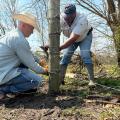Cleanup Safety
Follow these steps provided by specialists with Mississippi State University's Extension Service when returning to storm damaged dwellings and beginning repairs and cleanup:
Turn off gas lines in the structure as soon as you arrive and make sure the power is off.
Check for structural damage before entering a damaged or flooded building. Look for sagging support beams in the attic or floor, and cracks in the walls, stucco, bricks, or foundation as evidence of shifting caused by the high winds or water.
Raise the windows to let out any gas fumes that may have leaked inside. Don't use a range, hot water tank, or any gas appliance until the gas company has checked the lines.
Use flashlights for lighting rather than candles or any flame. A flame could set off a fire if gas fumes are present.
Even if the structure is safe, there can still be danger lurking inside in the form of snakes or small animals which may have taken refuge from flooding.
After the area has been determined safe, make temporary repairs to prevent more damage.
Drink only bottled water or tap water that has been boiled a minimum of five minutes or treated with four to six drops of bleach per gallon of water. Stir the water to make sure the bleach is distributed before drinking.
Keep refrigerator and freezer doors closed as much as possible. Check refrigerated and frozen foods if there has been a power outage. When in doubt, throw it out.
Foods in a full, free-standing freezer will remain frozen for about two days, one day if the freezer is half-full. Items that still contain ice crystals and feel "refrigerator- cold" can be refrozen.
Discard refrigerated foods if the power is out for more than four to six hours unless steps were taken ahead of time to turn the temperature to its coldest setting or ice was added to the refrigerator before the power outage. Discard any item that has risen to room temperature and has remained there for two or more hours.
Resist the urge to move around and see the damage done elsewhere. Standing water can carry deadly electrical currents from downed power lines.
Publications
News
EGYPT, Miss. -- On hot days, Robert Thompson’s beef cows used to retreat to a cluster of trees in the middle of his pasture for shade.
STARKVILLE, Miss. -- After natural disasters, food and shelter are prioritized well above mental health, but ignoring emotional distress can lead to serious physical health conditions.
STARKVILLE, Miss. -- A Mississippi State University Extension program coordinator will serve as chair of the Extension Disaster Education Network, EDEN, for a two-year term.







